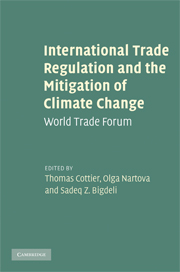Book contents
- Frontmatter
- Contents
- Contributors
- List of figures
- List of tables
- List of abbreviations
- Preface
- PART I Climate change mitigation: scientific, political and international and trade law perspectives
- PART II Climate change mitigation and trade in goods
- PART III Trade in renewable energy sources
- PART IV Climate change mitigation and trade in services
- PART V Climate change and technology transfer, investment and government procurement: legal issues
- PART VI Institutional challenges and the way forward
- Index
Preface
Published online by Cambridge University Press: 04 August 2010
- Frontmatter
- Contents
- Contributors
- List of figures
- List of tables
- List of abbreviations
- Preface
- PART I Climate change mitigation: scientific, political and international and trade law perspectives
- PART II Climate change mitigation and trade in goods
- PART III Trade in renewable energy sources
- PART IV Climate change mitigation and trade in services
- PART V Climate change and technology transfer, investment and government procurement: legal issues
- PART VI Institutional challenges and the way forward
- Index
Summary
The World Trade Forum series was established in 1997 to offer an opportunity for an international in-depth discussion of issues facing the world trading system. The topic chosen for the 11th World Trade Forum was: International Trade Regulation and the Mitigation of Climate Change. On 21 and 22 September 2007 more than seventy-five people representing international organisations and governments, as well as distinguished academic scholars, climate scientists and students of international economic law from many different countries met at the World Trade Institute of the University of Bern to discuss what role the multilateral trading system could play in promoting state participation in the fight against global warming. The forum was opened by a leading climatologist from the NCCR ‘Climate’, Martin Grosjean, who provided the forum with an overview of the science behind the climate change debate.
The theme of climate change is particularly timely because the Intergovernmental Panel on Climate Change (IPCC) 4th Assessment Report, the first volume of which was published in February 2007, re-affirms that human activities have indeed contributed to the warming of the globe. Earlier, in 2006, the Stern Review on the economics of climate change, supported by many economists, some of whom are Nobel Prize winners, stated that ‘the benefits of strong and early action far outweigh the economic costs of not acting’. This year's World Trade Forum, after touching briefly upon the current state of scientific knowledge on climate change, outlined the background for the legal ways forward after the expiry of the Kyoto Regime in 2012.
- Type
- Chapter
- Information
- International Trade Regulation and the Mitigation of Climate ChangeWorld Trade Forum, pp. xvii - xviiiPublisher: Cambridge University PressPrint publication year: 2009



